The carpet trading and manufacturing industry goes as far back as the Mughal empire in the Indian subcontinent. In the 21st century, gender gap in business ownership should be anything but commonplace. Yet, one would not have to look too closely to realise it is difficult to find women working as self-reliant carpet traders and manufacturers.
India is the leading producer of handmade carpets in the world, accounting for 35 per cent market share globally, followed by Iran, China and Nepal. The cottage industry's shipment is growing by 10 per cent every year; the export of carpets in 2016-17 was estimated to be over Rs 10,000 crore. Around 85 per cent of handmade carpets produced are meant for export, and is a valuable source of foreign exchange, employing more than 20 lakh workers and artisans, especially rural women, in this highly labour-intensive, skill-oriented industry. It is high time we look beyond the glorification of women in the carpet industry as just weavers and artisans.
At the ongoing 35th Carpet Expo, organised by the government-run Carpet Export Promotion Council and launched on March 8, the International Women's Day, there is enough awareness and acknowledgment of the work being done by women weavers and artisans in carpet manufacturing hubs of Jaipur, Agra, Mirzapur, Bhadohi and Banaras, but little in the way of their presence as business and trading representatives.
In what is considered to be one of the largest carpet fairs in Asia―this year, the fair has roped in 350 carpet importers from 60 countries―the fair directory on Indian exhibitors had just three women listed as interface between buyers and their carpet company. Two hundred and fifty eight Indian exhibitors are participating in the expo.
“In Agra, where we have our weaving units, it is majorly young girls who are involved in weaving before they get married, that is between 16-18 years of age or 20. They are the ones who are working on the loom and actually weaving the carpets,” says Shephali Wattal from Gopal Wattal & Co. which manufactures exclusive handmade rugs.
Armed with a finance degree, Wattal mostly works in conjunction with her husband Gopal Krishna Wattal whose grandfather started manufacturing carpets in 1929. She mentions other women who are prominent names in the carpet-making industry such as Alpa Mewawala from Agni and Asha Chaudhary from the premier Jaipur Rugs, one of the foremost companies in the carpet business today. Mewawala has been manufacturing and exporting rugs with her husband for close to 35 years from Bhadohi, and Chaudhary is the daughter of the carpet baron Nand Kishore Chaudhary.
“Gradually, I have noticed young women are getting into the carpet business. You know, when they get married, many of them join their husbands in the business,” says Wattal who also sums up the typical profile of a few handful of women at the forefront of selling carpets. Most of them are third generation entrepreneurs who go on to inherit family-run businesses. Self-starting women entrepreneurs are very hard to find in the heavily male-dominated heritage industry of rugs. But even while many are actively taking up hefty roles in their companies, it is more often than not confined to designing and marketing. Very few assume real decision-making roles.
Sarita Sarna is managing director at Sarna & Associates, a leading distributor and supplier of carpets. She says she is the first female export agent of carpets in India. She joined her father's business in 1985 and assumed the role of MD after her brother's death in 2004.
“Carpet-making is a very specialised work which is going from carpets to floor covering. I hope you find the difference in that. Carpet is no more an artwork. And every second person is an agent. On the other hand, even the buyers don't know what to buy. Women are coming to the forefront, but I am not sure how much they know about carpets,” says Sarna.


